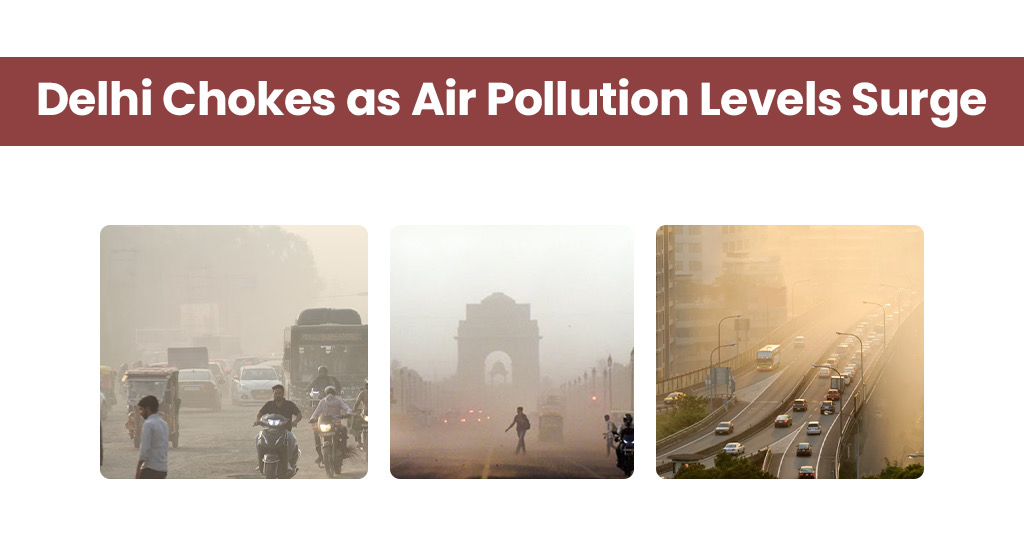This morning, residents of Delhi-NCR woke up to a heavy layer of smog, with the air quality index (AQI) remaining firmly in the “very poor” category. Last week, the AQI for the national capital fell to “very poor,” with several monitoring stations approaching the 300 mark. In response, the Commission for Air Quality Management (CAQM) ordered the implementation of Graded Response Action Plan (GRAP) Stage-II in Delhi-NCR and surrounding areas.
According to the order issued by the CAQM, the statutory body directed authorities to implement the revised schedule for GRAP Stage-II. “In an effort to prevent further deterioration of the air quality, the Sub-Committee has decided that all actions as envisaged under Stage II of the GRAP-Very Poor Air Quality (Delhi AQI ranging between 301-400) be implemented in right earnest by all the agencies concerned in the NCR, in addition to the Stage-I actions already in force, from 8:00 am on October 22 in the National Capital Region (NCR),” the CAQM order read.
According to real-time data from the System of Air Quality and Weather Forecasting and Research (SAFAR), the AQI levels are categorised as follows: 0-50 is good, 51-100 satisfactory, 101-200 moderate, 201-300 poor, 301-400 very poor, 401-450 severe, and above 450 severe-plus. Today’s reading places us squarely in the “very poor” zone, raising alarms for the health and well-being of residents.
Neighbourhoods particularly impacted include Alipur, Anand Vihar, Ashok Vihar, Aya Nagar, Bawana, Burari, Dwarka, IGI Airport (T3), Jahangirpuri, Mundka, Narela, Okhla, Patparganj, Punjabi Bagh, Rohini, RK Puram, Vivek Vihar, Shadipur, Sonia Vihar, and Wazirpur.
The India Meteorological Department (IMD) has forecast that Delhi’s air quality index (AQI) is likely to remain in the “very poor” category (AQI 301-400) in the coming days due to unfavourable meteorological conditions and calm winds.
Health concerns shoot due to pollution
This air pollution in Delhi has become a significant public health crisis, leading to a wide array of health problems, particularly respiratory issues such as asthma, bronchitis, and chronic cough. Individuals with pre-existing conditions, like asthma or cardiovascular diseases, are especially vulnerable; exposure to polluted air can exacerbate their symptoms and increase the likelihood of hospitalisation. Even healthy residents are not immune; many experience irritation in the eyes, nose, and throat, along with difficulty breathing during high pollution episodes.
The current air quality situation in Delhi is concerning, with the Air Quality Index frequently reaching “very poor” levels, exacerbated by factors like pollution due to ongoing festivities and crop stubble burning in nearby states. Long-term exposure to such pollution is linked to chronic respiratory diseases and reduced lung function, as well as mental health issues, including anxiety and depression. Children and the elderly, due to their more vulnerable immune systems, are at an even greater risk.
What’s GRAP Stage-II?
Introduced in 2017, GRAP is a proactive system that sets into motion specific actions in response to the Air Quality Index (AQI). Stage II of this plan tackles pollution levels deemed “Poor” to “Very Poor” and is an integral part of a robust four-stage framework designed to combat air pollution in Delhi-NCR. As pollution escalates, this framework ramps up its measures, with Stage IV aimed at addressing the most severe conditions. This year, the implementation of GRAP-II is particularly pivotal in mitigating the annual surge in air pollution that often follows the Diwali festivities and is further intensified by the burning of crop stubble in adjacent states.
In response to the severe air pollution, the Commission for Air Quality Management (CAQM) has enforced GRAP Stage-II, which includes several key actions:
- Daily Cleaning: Authorities are required to carry out mechanical and vacuum sweeping, as well as water sprinkling on identified roads each day.
- Dust Suppression: Water sprinkling with dust suppressants must occur at least every other day during non-peak hours, focusing on hotspots and heavy traffic corridors to control road dust.
- Hotspot Management: Targeted actions to reduce air pollution in identified hotspots should be intensified, particularly for the predominant sectors contributing to poor air quality.
- Power Supply Assurance: Authorities must ensure uninterrupted power supply to reduce reliance on diesel generators.
- Regulated DG Set Operations: Strict enforcement of regulations on diesel generator use across all sectors in the NCR is mandated.
- Increased Parking Fees: Raising vehicle parking fees aims to discourage the use of private transport.
- Support for Security Staff: Resident Welfare Associations (RWAs) are advised to provide electric heaters to security personnel to prevent open burning of biomass and municipal solid waste during winter.
- Construction Inspections: Authorities must intensify inspections to enforce dust control measures at construction and demolition sites.
- Ban on Open Burning: Open burning of waste is strictly prohibited under GRAP-II, with enforcement teams monitoring compliance and imposing fines on violators.
- Restrictions on Power Plants: Older coal-based thermal power plants face operational restrictions, requiring them to reduce capacity or shut down temporarily to lower emissions.
- Traffic Management: The plan emphasises improved traffic management to alleviate congestion and reduce vehicular emissions.
These measures are part of a comprehensive effort to combat severe air pollution in Delhi-NCR and protect public health.
The cumulative health effects of Delhi’s air pollution underline the urgent need for effective air quality management and public health interventions to mitigate these risks and protect the health of its residents.
As the city grapples with this ongoing air quality crisis, it’s crucial for everyone to take extra precautions. Minimising outdoor activities, wearing masks, and using air purifiers can help protect your health. Let’s stay informed and look out for each other as we navigate these challenging conditions together.








